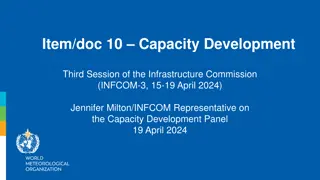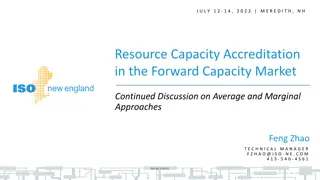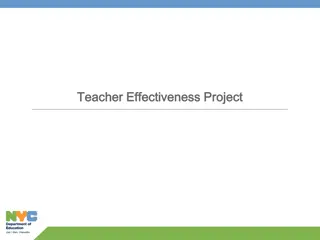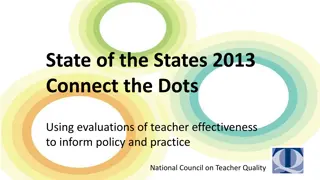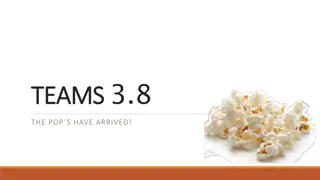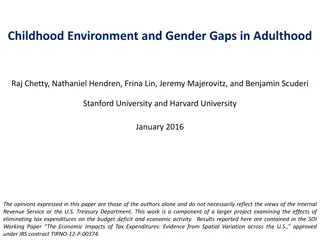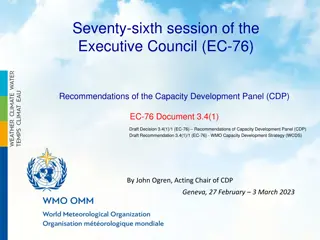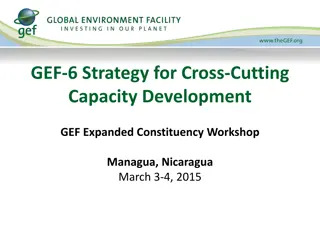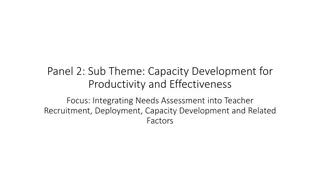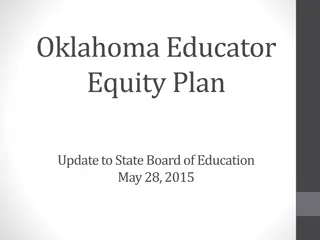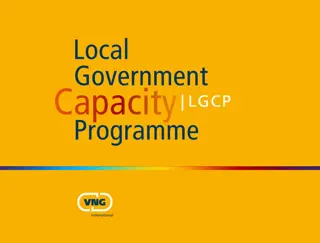
Enhancing Teacher Capacity for Improved Learning Outcomes
Explore the challenges and gaps in teacher capacity development for enhancing learning outcomes, as discussed in the context of the 5th Nigeria's Annual Education Conference. Delve into issues such as one-size-fits-all approaches, needs assessment, inclusiveness in training, disparities in resources, and the importance of monitoring and evaluation. Uncover how repositioning the education sector requires a systemic approach to address these critical factors.
Download Presentation

Please find below an Image/Link to download the presentation.
The content on the website is provided AS IS for your information and personal use only. It may not be sold, licensed, or shared on other websites without obtaining consent from the author. If you encounter any issues during the download, it is possible that the publisher has removed the file from their server.
You are allowed to download the files provided on this website for personal or commercial use, subject to the condition that they are used lawfully. All files are the property of their respective owners.
The content on the website is provided AS IS for your information and personal use only. It may not be sold, licensed, or shared on other websites without obtaining consent from the author.
E N D
Presentation Transcript
5th Nigerias Annual Education Conference 28th-29thNovember 2019 Theme: EDUCATION FOR SUSTAINABLE LIVELIHOOD: A SYSTEMS APPROACH TO STRENGHTHENING THE SECTOR FOR PRODUCTIVITY AND GLOBAL COMPETITITVENESS Panel 2 Sub-theme: Capacity Development for Productivity and Effectiveness
Focus: Addressing Gaps in Teacher Capacity Development Towards Improved Learning Outcomes Preamble The demands of the emergent knowledge economy require teachers to align with the dynamics of emergent curriculum that requires application of new competences and skills to prepare learners for global competiveness It is assumed that bridging the gap in knowledge and skills through training or retraining of teachers would necessarily translate into improved learning outcomes for learners; but this is not always the case. For example in 2003, Primary 4 Pupils performance n Learning Achievement assessment was, 33.3% (SD 20.32) in mathematics; 35.05% (22.66) in English language and 43.81 (25.59) in Life Skill
Preamble Continued As part of measures to reposition the sector for improved performance in 2005, the Federal Ministry of Education under the UBE scheme, introduced the Teacher Professional Development Programme for all categories of teachers at the basic education level. Since then, the UBEC supports the TPDP with 10% of its total annual allocation] the bulk UBE fund addresses other components of quality including text books, teachers guide, supply of infrastructure and others The last National Assessment, 2011 showed that apart from a slight increase in performance on mathematics 36.28% (SD 18.78), there were decreases in mean percent performances in Literacy 31.07 (SD 17.74) and Life Skills 39.12 (SD19.89). The implication is that training does not always translate into improved learning outcomes.
Gaps That Training May Not Always Address Purpose of this discussion is to identify factors that have sometimes been overlooked in addressing teacher capacity development One size fits all Vs Needs Assessment Generating Learning Materials; Trainer Centered Vs Inclusiveness Equity Vs Disparity in access to teaching and learning resources Head teacher and Supervisors are adequately competent and supportive Where of capacity development, Training venue Vs In-school or Classroom
Gaps that Training may not Always Address Continued Impact Assessment- Is there Monitoring and Evaluation What are the Key Performance Indicators for tracking goal attainment Is there a feed back system and adequate motivation Does the feed back system include the regular Monitoring of Learning Achievement for policy decision making to support classroom practices and other aspects of education delivery Do Teachers possess the right attitude and values; can these be integrated into training scheme, Ecetera
The demands of the emergent knowledge economy require teachers to align with demands of any emergent curriculum that requires application of new competences and skills that will prepare learners for global competiveness


